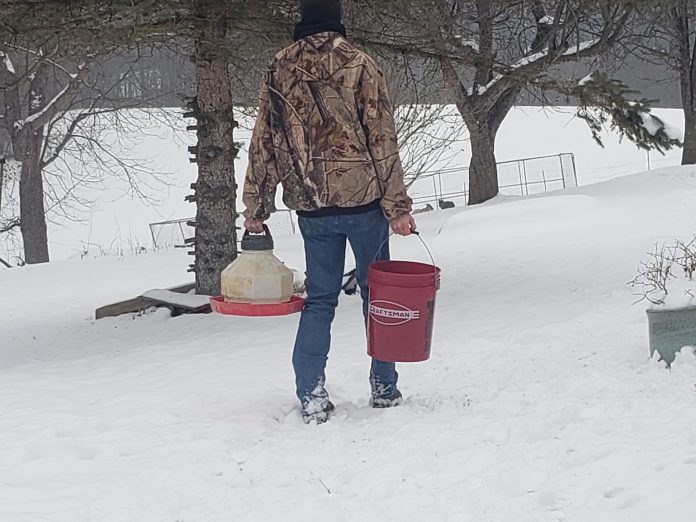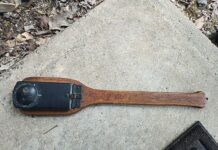
Let’s talk water systems. One of my least favorite activities of winter is carrying water to livestock when the temperature is in the 20s or below and the wind is hitting you in the face.
Every time I walk down the hill with two five-gallon buckets of water, I pray I do not slide on the compacted snow and ice that February always seems to bring. Usually, I fall, a bucket of water flies up in the air and I end up wet and even colder than I started, and now I must walk all the way back and refill my buckets.
I ask myself everyday, who came up with this grazing plan and (lack of) water system? Oh, yeah, that was me.
Nutrients
Livestock need basic nutrients to reach their potential for production and weight gain. Water is the most important nutrient that our livestock require. Water requirements vary depending on the species, so it is important to be aware of what your animals need to be healthy and thriving.
The table included can be found at ohioline.osu.edu/factsheet/ANR-12, in the water factsheet written by my predecessor, Mark Landefeld. It covers topics of water troughs and space required.
This table is a good representation of the amount of water various species need throughout the day. Notice dairy cows require up to 30 gallons of water a day, in order to produce milk, and sheep and goats can be maintained on two-three gallons of water a day.
Running water
No matter how many gallons of water you provide, winter will find a way to create ice on any water source.
Have you ever thought about why running water seems to take longer to freeze than standing water? The science behind this phenomenon is rather interesting. Running water can freeze. It just appears to take longer because the water is continuously being circulated. Water will freeze at 32 degrees Fahrenheit, but for flowing water to freeze, the air needs to be colder than that.
Circulating water allows the colder water on the surface to mix with the warmer water on the bottom. But even this process has its limitations, and once the temperature gets cold enough, it will freeze as well.
Water systems
Winter weather can create challenges for providing fresh, clean and unfrozen water. Planning and being prepared are important. There are different types of water systems to choose from. You just need to find the one that best suits the needs of your operation.
Water systems are an integral part of owning livestock and can range from simple systems, such as a bucket of water that is changed out regularly, to larger systems, such as troughs and heated systems that provide fresh water to a larger number of animals.
Factors
A couple different factors will determine which route you take. What is the water source you have available? Options include ponds, streams, tap water, wells, cisterns and springs. Are waterers going to be installed? If you are using a trough, directing the inlet pipe along the side of the trough will promote water circulation, reducing the chance of freezing.
You can also prevent ice accumulation by placing water warmers in troughs, and you will be thankful later when you don’t have to go out with a hammer and dig out the ice.
Do you have electricity available in the location that water will be offered? If electricity is unavailable, propane tanks and batteries can serve as energy sources.
Switching out
If none of these options are available to you, regularly changing out frozen buckets of water is feasible on smaller scale operations or hobby farms. It can be frustrating at times, but it is doable.
Over the years, we have gone through quite a few plastic buckets that have cracked when the water freezes. What I would not give to have a waterer installed closer to the chicken coop. Our day usually consists of constantly carrying buckets of water in and out of the house and thawing them in the bathtub with hot water.
The temperatures over the last few weeks, have brought concerns about freezing pipes and loss of electricity. So currently, I have multiple five-gallon buckets of water sitting by the back door to take to the goats and chickens. Our dog thinks they are all her own personal water dishes, and she is living her best life right now during this awfully cold February.
So, my wish to you is that you also are living your best life, and hopefully the news forecast of warmer temperatures comes true soon. Remember, spring is right around the corner.












